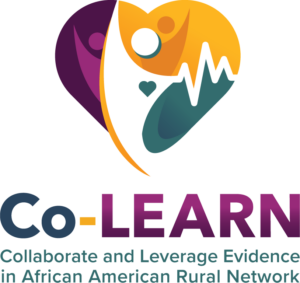Collaborate and Leverage Evidence in African American Rural Network (Co-LEARN)
Background
Collaborate and Leverage Evidence in African American Rural Network (Co-LEARN) is an education program to reduce the burden of heart disease and its risks in rural North Carolina counties. Co-LEARN has two components: a learning collaborative and Heart Matters.
Heart Matters is a 12-month, comprehensive lifestyle modification education program, focused on lifestyle changes such as diet and exercise, to decrease blood pressure. High-quality heart disease prevention programs help participants lower their risk in multiple ways including, eating less salt and fat, moving more, limiting alcohol intake, and losing weight. This program uses interactive individual and group educational sessions to help participants learn new information, build new skills, and set and track their goals over a year-long period. Sessions are led by community members trained to deliver the program, such as teachers, coaches, and clergy members and health professionals like nutritionists, nurses and personal trainers. It has been tailored for rural African American communities with education session facilitators, and diet and exercise experts from the community.
The next step is to implement the program in this setting and test its real-world impacts on cardiovascular health. However, organizations in rural communities may face unique barriers to implementing and sustaining programs, even when tailored to their context. Co-LEARN will engage community members to collaborate in addressing these barriers. Small groups of community members will work together to develop strategies for implementation of Heart Matters. These groups will build a foundational blueprint that builds organizational readiness, strengthens connection networks, and increases the efficacy of Heart Matters.
Keywords: Health Disparities, Rural Populations, African Americans, Cardiovascular Disease, CBPR
Objective
The Co-LEARN project focuses on mitigating the disparate incidence of cardiovascular disease (CVD) in rural African American populations in Eastern North Carolina. The study has two key parts: the implementation of Heart Matters (see Heart Matters project description) and the formation of the Learning Collaborative. Through the Learning Collaborative, the project intends to develop strategies that predict and overcome barriers to successful implementation of Heart Matters and thus successfully adapt the intervention to a rural setting.
 Study Team/Roles
Study Team/Roles
- Gaurav Dave, M.D., DrPH, MPH: PI
- Giselle Corbie, M.D., M.Sc.: Research Program Manager

